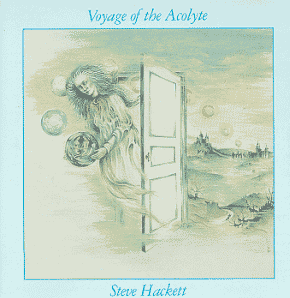Steve Hackett
Voyage of the Acolyte
Virgin (CASCD1111)
UK 1975
Steve Hackett, guitars, mellotron, harmonium, bells, autoharp, vocal, effects; John Hackett, flute, ARP synthesiser, bells; Mike Rutherford, bass, bass pedals, fuzz 12-string; Phil Collins, drums, vibes, percussion, vocals; John Acock, Elka Rhapsody, mellotron, harmonium, piano; Sally Oldfield, vocal; Robin Miller, oboe, cor anglais; Nigel Warren-Green, cello; Percy Jones, bass; Johnny Gustafson, bass; Steve Tobin, parrot, cough
Tracklist:
1. Ace Of Wands — 5:23
2. Hands of the Priestess Part I — 3:28
3. A Tower Struck Down — 4:53
4. Hands of the Priestess Part II — 1:31
5. The Hermit — 4:49
6. Star of Sirius — 7:08
7. The Lovers — 1:50
8. Shadow of the Hierophant — 11:44
total time 40:52
|
|

Sean McFee:
In the break between Gabriel-era Genesis and the four-member band, guitarist Steve Hackett took some time to release his first solo album. Rutherford and Collins help out here, although not surprisingly Tony Banks is absent. Other guests of note include Steve's brother John and Sally Oldfield.
This gives an idea as to how good Genesis might have been had they allowed Hackett a stronger presence. There is some beautiful, haunting acoustic guitar playing ("Hands of the Priestess"), some frenetic but still melodic chaos ("Ace of Wands", "A Tower Struck Down") and majestic composition on a grand scale ("Shadow of the Hierophant"). Hackett composes and plays music running the gamut of prog with equal ease.
This is a solid album that fans of the Genesis sound will have no absolutely no problem enjoying. In many ways, it's better than what they were doing at the same time, as the lyrics are not subjected to Peter Gabriel's clever-to-a-fault tendencies, and of course Hackett has a more prominent role in the mix. Symphonic proggies should have no trouble finding lots to like here.
Joe McGlinchey:
During his stint in Genesis, Hackett took some time out to create his first solo album. To this day, it remains his best, and is more than worthy company for any of the classic-sequence Genesis albums. This may be in part due to the addition of Collins and Rutherford, giving it an obvious Genesis minus the name feel, but also the strong compositions on this effort show just how much Hackett attempted to bring to the band.
"Ace of Wands" and "Star of Sirius" are symphonic prog at its best, the latter featuring rather awkwardly beautiful harmonies from the pairing of Hackett and Collins. Contrast the pure tenderness of "Hands of the Priestess, Part 1" with the spine-tingling, portentous closing of "Shadow of the Hierophant" (both two of Hackett's finest moments, whether in or out of Genesis).
Whatever mood it is navigating through, Voyage masterfully nagivates. There are a few dull moments, but on the whole, this one's a classic representation of the genre.
Eric Porter:
An enchanting solo effort from Steve Hackett while still a member of Genesis. Mates Collins and Rutherford appear throughout, along with Steve's brother John and other guests. The material is mostly instrumental, and throughout the recording is a mystical feel. The cover art by Kim Poor (Steve's wife) fits the music perfectly . This is often described as the best record Genesis never made.
For one thing it is much more eclectic, yet all done with a certain grace and charm.
"Ace of Wands" runs through a variety of changes using acoustic guitar as its foundation, and applying sporadic moments of mellotron, flutes, bells to offset the main theme created by Hackett's electric lead guitar. Often within this track the sounds can be sparse, and then all of a sudden your headphones are filled with sound. The band charges to the finish line with more layered guitar creating a new melody to take you out of the song.
"Hands of the Priestess Part I" is a soft pastoral track with acoustic guitar and flute, Mellotron washes, chimes, and Hackett's trademark volume swells. "Hands Part II" uses parts of the same melody along with a few new treatments to tie the tracks together. "A Tower Struck Down" has a harsh feel, with its pounding rythymic bass, and off-color guitar and sound effects.
Lovers of the Mellotron will love its application on this track. The far off sounding vocals used on "The Hermit" create an eerie effect matched with acoustic guitar. The cello brings an added texture to the track. Oboe and acoustic guitar are teamed upon the intro for "Star of Sirius", and Collins is used for lead vocals. Drenched in Mellotron (as is much of this disc), the synthesizer makes a few appearances as the lead instrument during both the soft and upbeat sections.
"The Lovers" is a short acoustic guitar piece that again shows Hackett's interest in classical music, which he has flirted with throughout his recording career.
The powerful "Shadow of the Hierophant" closes the set, and displays almost all of Hackett's trademark sounds, featuring guest vocalist Sally Oldfield (Mike's sister). Tell me Eddie Van Halen never listened to this CD and I have a "Squonk" I will sell you.
Anyway, I don't think you have to be a Genesis fan to enjoy this; it is innovative and very original sounding, and if you love the Mellotron, it is heard throughout. I consider this a must have in any progressive collection.
|
